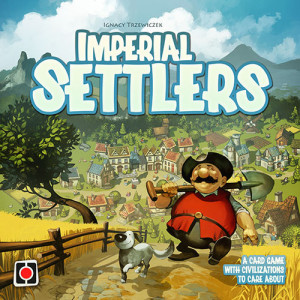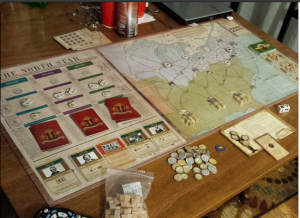Featured image for this article used through Creative Commons by Lee Haywood
 “Why would anyone want to play a board game by themself?” It was an honest question regarding the player count on the side of the box. I didn’t think much of it at the time, brushing the comment aside with some off-hand remark.
“Why would anyone want to play a board game by themself?” It was an honest question regarding the player count on the side of the box. I didn’t think much of it at the time, brushing the comment aside with some off-hand remark.
At another game night, I opened up my Imperial Settlers, played through it, and saw an entire stack of cards that were unused. That was when I started to take the question seriously. I noticed the growing number of games either created as solo games or containing variants written into the rules to play alone. I couldn’t see what the appeal would be.
I hit our twitter page and asked for recommendations for titles that demonstrate that design choice straight out of the box. After compiling the recommendations and doing a bit of my own research, I decided that I would have to dive in and explore the single player experience first hand. I couldn’t test every title on the list, but I already owned a number of them, so I’d start there. With that as my established set, the only remaining question was how to approach them.
The differences were overwhelming. Some needed special rules, others did not. Some were complex with dozens of moving bits, others involved just rolling a fistful of dice. The list contained dice games, board games, and card games. The only unifying thread throughout all of it was the player. So that became the question. How does it feel to change the experience? The answer was both expected and eye opening.
Every time I talk about why I’m so passionate about the place of board games in life and ministry, I find myself repeating some variation on the theme of community. Words like connection, incarnation, and fellowship are unavoidable. I was skeptical of this world I had entered. Take away the table talk and other players and it lost the joy that keeps me coming back. As my experiments went on, I was not proven wrong.
 After a few games, it stopped being “fun” in the classic sense. I would plan, take notes, move bits, and then my turn would be over. This would repeat over and over again in silent reflection. When the game ended successfully, I still felt good about playing well and succeeding, but it wasn’t the same. I did not have that moment of debrief. There was no talk of the good, bad, and ugly parts that unfolded. There was nothing that made it a bad experience. It just wasn’t a remarkable one — at first.
After a few games, it stopped being “fun” in the classic sense. I would plan, take notes, move bits, and then my turn would be over. This would repeat over and over again in silent reflection. When the game ended successfully, I still felt good about playing well and succeeding, but it wasn’t the same. I did not have that moment of debrief. There was no talk of the good, bad, and ugly parts that unfolded. There was nothing that made it a bad experience. It just wasn’t a remarkable one — at first.
I kept playing. I scoured deep dungeons, defended my castle from orcish hordes, and attempted to end slavery through influence and speed. I missed having other players to cheer with or gloat over. I wanted someone to talk to about close calls and bad rolls. While those frustrations were never really assuaged, something else began to step away from the shadows. It was a puzzle. A glorious, frustrating, brilliantly made puzzle.
I was able to focus entirely on the nuts and bolts of the game in front of me. I watched the pieces turn and dared them to come get me. Sometimes I was successful, like when vanquished my second dragon in the same run through Dungeon Roll and sat back asking myself if I could survive a third. Other times I struggled to find a way around the nightmare.
It may seem obvious – but trying to tackle generations of institutional slavery is not easy to do by yourself. The combination of dice and programmed movements in Freedom that drew the slave catchers across the board was demoralizing and hopeless. It was beautiful.
In these moments, the curtain was pulled back and I was able to see a small glimpse of the skill the designers had put into their works. They did it in a dozen different ways, but they had all honed their game to a precise edge. There is no such thing as a perfect game, but I took notes, made observations, and enjoyed the games in a new way.
I didn’t see dice, for example. I saw the varied ratios of dice faces to make sure the game was balanced when they were rolled. When I used a special effect that let me step past the line I thought was my far boundary – I wondered how many games were played before they realized this exact scenario was even possible. Did they even know it was?
Playing with other people is about the joy of the moment and the connections that last after the board is gone. Playing solo is about the beauty of the mechanism and the wonder of design coming together to make a unique experience. After putting in time with these solo variants, I don’t think I’m capable of doing a comparison in the truest sense of the term. While a well designed game can be played either way to a positive result, when they are seen from both sides – the complete picture is just deeper.
At the conclusion of my experiment, I was challenged. Personally, I thrive on people and being alone is hard. Silence and reflection is not my natural state. It is something I have to force myself to do, even though I almost always come out of those times refreshed. For myself, it becomes an act of spiritual discipline. There is a reason that the Bible both commands involvement in the community of faith as well as setting aside time for quiet reflection on the work of God. The experience needs to be varied if real growth, development that goes beyond a perspective that is myopic and draining, is to happen.
I’m not going to be an avid solo game player, but I will be adding some of these games to my collection for those times I want to change things up. Normal truly is overrated.





